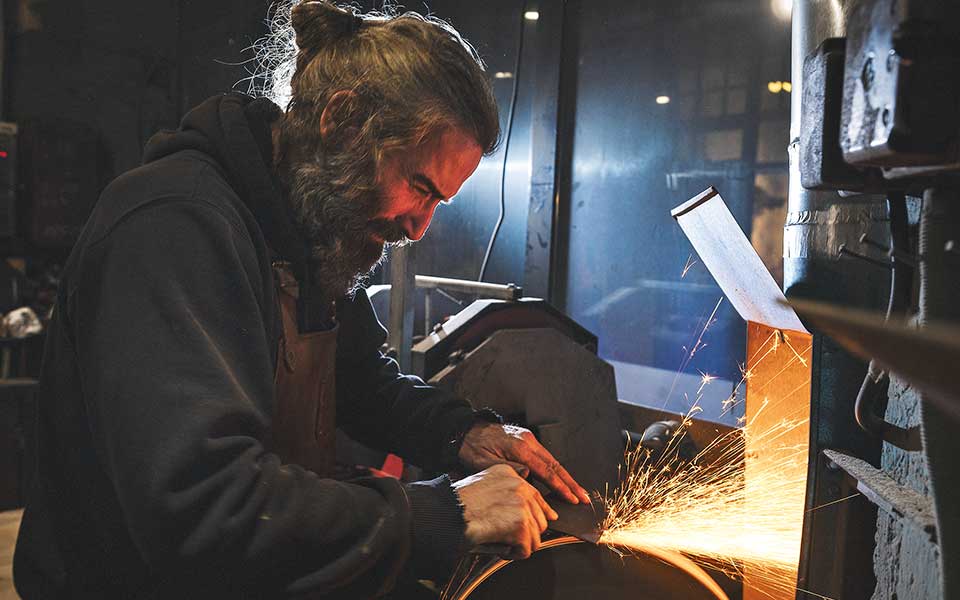From the end of Ottoman rule and throughout the 19th century, the market of Ioannina was located on Anexartisias Street and its side streets (the Bahram district). Tailors, blacksmiths, coopers, bell-founders, and tobacco workers did not practice their craft in dark arcades or alleys; instead, they worked in public, in front of passersby. Food markets and silversmith workshops could also be found in the surrounding streets, adding to the commercial and economic strength of the city. All of this lasted until the mid-1960s when Ioannina’s urban development brought about significant changes. The demarcation of the Historic Center, the new zoning plan, and industrialization moved the markets and eliminated professions.
Today, these narrow cobblestone streets mostly house trendy entertainment venues. Few traditional workshops remain here, although recently young artisans have been looking for suitable premises within the Historic Center. In any case, the heavier trades have long since moved out of town or to the outskirts of the city. We met six traditional craftsmen who, despite the times, continue to work with their hands and who spoke to us about their efforts to continue being a living part of our cultural heritage, rather than museum pieces.
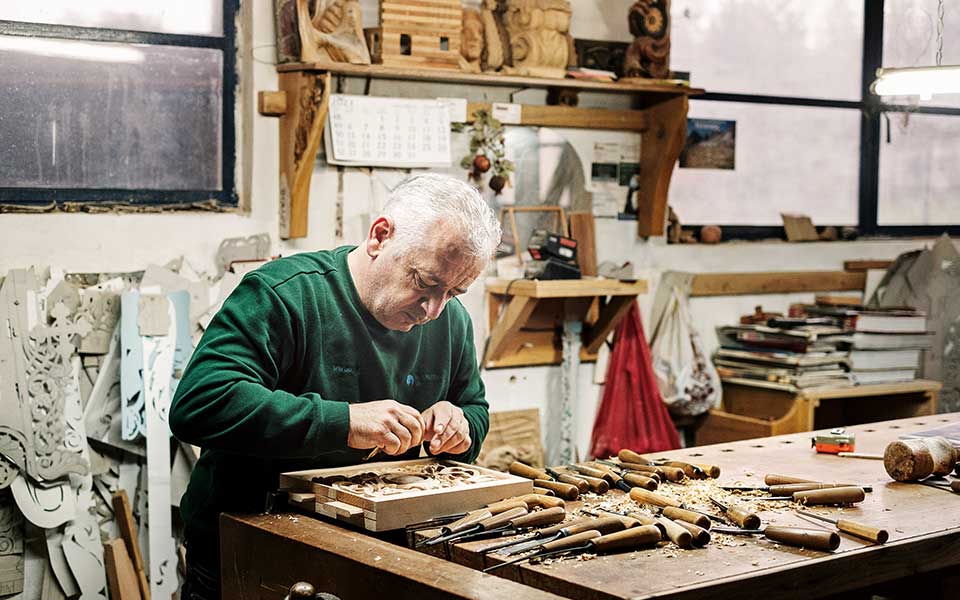
© Konstantinos Tsakalidis
Dimitris Mageirias, wood sculptor
Woodcarving is an essential component of the Epirotic tradition. This folk art, which continues to captivate us today, was popularized after 1659 by itinerant Metsovo craftsmen who traveled throughout Greece, the Balkans, and Central Europe.
The reconstruction of the city of Ioannina during the 19th century combined Byzantine and Oriental elements, as the design of new houses was based on the mansions that were burned down when the city was destroyed by Ali Pasha in 1820. Wood-carved decorations became an integral part of churches over time, with iconostases, proskynetaria (lecterns), despotic thrones, and other items attesting to the skill of the carvers.
The few remaining craftsmen continue to focus on these types of projects, as carved wooden pieces are rarely used to decorate modern homes. One of them is Dimitris Mageirias, who started in 1988, drawing knowledge and inspiration from two experienced craftsmen, Apostolis Ilias and Iraklis Balavas, both graduates of the famous Georgios Stavros Technical School. He worked alongside them on the decoration of Aghios Raphael in Goumenissa and Aghios Nektarios in Trikala. Since starting his own business in 1999, he has completed several projects, including the Holy Monastery of Lekatsa in Preveza and Aghios Nektarios in Nafpaktos. The dominant motifs are Byzantine and Baroque, with the former being more affordable as the themes are simpler and require less carving. “We always work together with the priests, but each of our projects is unique. We have never used the same design for two churches,” he clarifies. He also explains that, while he uses only local walnut wood, the oak comes from Greece, the United States, Slovenia, and Serbia.
Info
Dimitris Mageirias
Rododendri
Tel. (+30) 698.366.6151
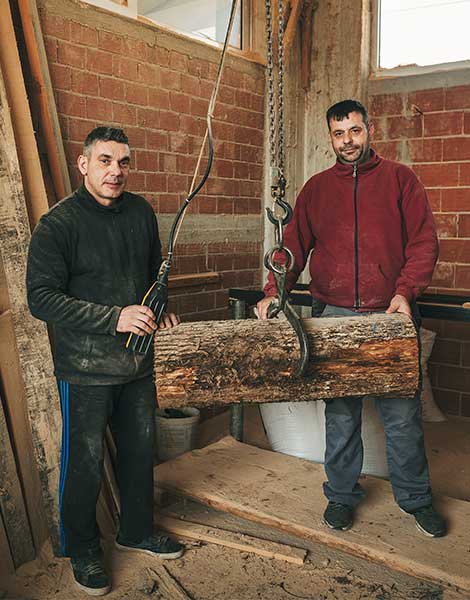
© Konstantinos Tsakalidis
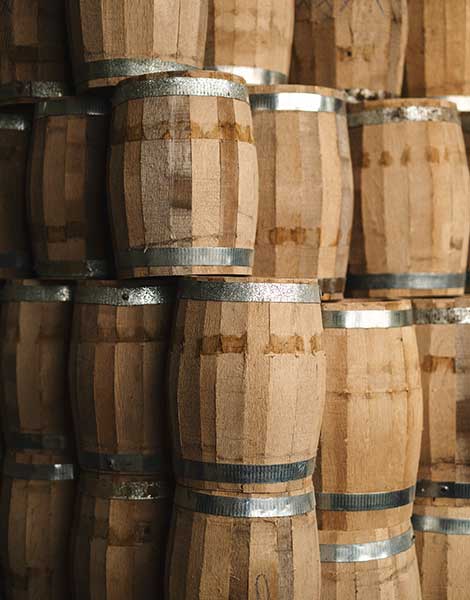
© Konstantinos Tsakalidis
Panagiotis Soulios and Panagiotis Soulios, coopers
Four generations have worked at the Panagiotis Soulios family cooperage, which was founded in Milia, Metsovo, in 1916. “There used to be many workshops in Northern Greece, but only four remain today. Because life has changed so much, our work is becoming obsolete. People no longer have cellars to store barrels, or they go for more affordable containers. However, a barrel has a long lifespan; buyers will replace it in 50 years, so it is essentially an investment,” explain the two cousins with the same name (Panagiotis Soulios), who continue the craft of handmade barrel making.
They specialize in wine barrels and claim that using barrels is the only way to guarantee a high-quality result. “Wood breathes and adds value to the wine as it ages, while inert materials add nothing,” they claim. Tsipouro (a Greek spirit), on the other hand, should be aged in a barrel for a year to develop vanillin and wood aromas while retaining its freshness.
They primarily work with Greek and Romanian oak, but they also use chestnut and walnut. They prefer robolo, a now-endangered tree native to the Pindus Mountains that is suitable for retsina production because it produces resin, which adds a natural aroma. Their clients include private individuals and small wineries, “as the larger ones purchase French barrels because they are subsidized,” they tell us, lamenting the lack of state support for their disappearing trade.
In addition to wine barrels, they also manufacture containers for cheese, milking pails, dough bowls, and butter churns, as well as barrels for bars and containers for growing trees in gardens and commercial spaces.
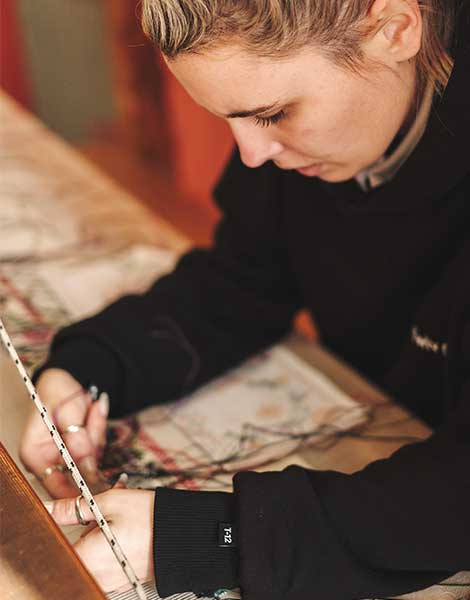
© Konstantinos Tsakalidis

© Konstantinos Tsakalidis
Nikoleta Tziobou, weaver
Using wool, cotton, and a lot of passion, the students and craftswomen of the Rizarios Handicraft School in Monodendri are hunched over their looms, reviving the craft of weaving, which is an integral part of the tradition and culture of Epirus. According to Ifigenia Gepi, the school’s director, “This craft was preserved thanks to the EOMMEX schools (Hellenic Organization of Small & Medium Sized Enterprises & Handicrafts), but the Rizarios is unique in that, since it first began operating in 1979, it has provided not only professional training but also a home for the girls.”
Nikoleta Tziobou, 24, began weaving her own professional journey when she joined the school four years ago. She has now completed her training and wants to continue working at the school as a weaver and eventually a teacher. Her weavings incorporate both traditional and more modern patterns inspired by the region’s rich cultural history. “No matter how many designs you create, the loom has its own limitations that challenge the mind and test your creativity,” she says.
The craftswomen here work exclusively with their hands: they learn to draw the design on paper and use it as a guide to weave the fabric and embroider at the same time, which calls for focus and concentration. Despite being the most difficult of the techniques they are taught here, everyone agrees that it is also the most fascinating.
All items produced in the workshop are either purchased by guests, used to fill custom orders, or end up in the school’s gift shop. Wall hangings, curtains, tablecloths, fireplace mantels, carpets, and other handmade items remind us of the hard work involved in creating handmade items as well as the importance of respecting the environment; they may also inspire a new wave of creativity that lies somewhere between craft and art.
Info
Handicraft School Monodendri Zagoriou
Tel. (+30) 26530.713.82
shop
Tel. (+30) 26530.711.19
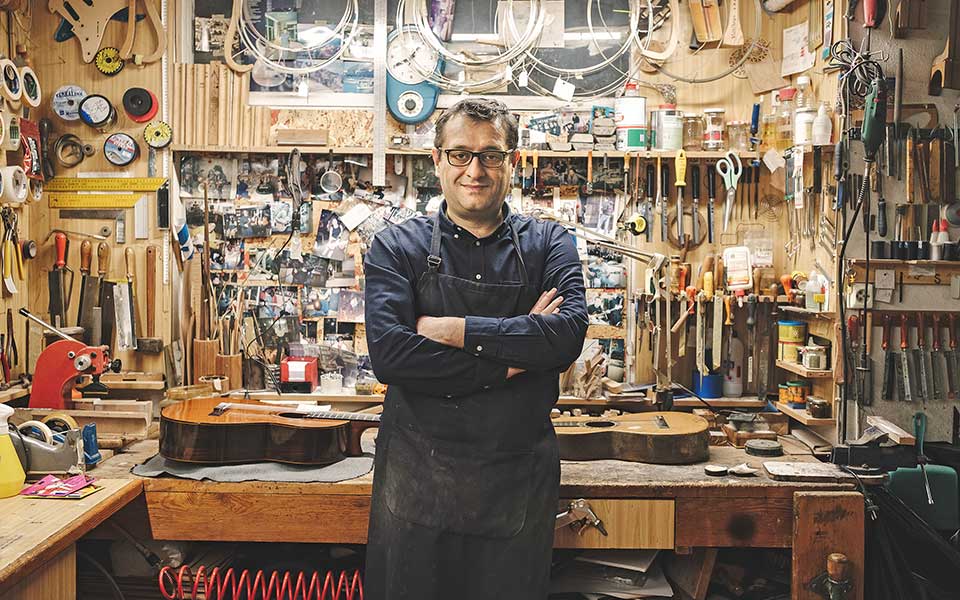
© Konstantinos Tsakalidis
Stavros Dukas, luthier
Upon returning from Wiesbaden, Germany, in 1985, Christos Dukas established Dukas Guitars in Ioannina, a workshop for the repair and building of stringed instruments that specializes in guitars. A student of Dragan Musulin and Christian Stoll, he passed on the craft of instrument making to his son Stavros, who has since taken over the company. Today, he has clients from China, France, Italy, and Germany, and he has welcomed musicians such as Nikos Portokaloglou, Doug Aldrich of Whitesnake, Nigerian afro-jazz guitarist Adetayo Adedeji, Vaso Dimitriou, blues guitarist Ilias Zaikos, George Gakis, and others into his studio.
Each genre has its own demands, but Stavros’s love for rock music led him to work on bolt-on neck guitars. He creates custom electric guitars for those who want a one-of-a-kind instrument with a distinct aesthetic. Each piece has its own distinct story and is the result of extensive discussion about specifications, materials, and decoration.
He has produced more than 120 guitars since 2003, carefully choosing the wood for each one. Except for olive wood, which he uses for a specific pickguard, all other woods, including mahogany, maple, walnut, and the now extremely rare Brazilian rosewood, are imported. Nik Huber, a world-renowned master luthier from Germany, is his mentor in this process. Ten years ago, together with his musician wife Yiota, Stavros Dukas started collecting rare Renaissance pianos, which he restores for clients looking for something special.
Pyrography, airbrushing, and hand painting are some of the techniques used to decorate the guitars, and Stavros expresses admiration and respect for his valuable collaborators who handle this part of the work, such as painter Alexandra Kaltsouni and Stelios Lampadaros, who has won awards for his airbrush work on Harley-Davidson motorcycles.
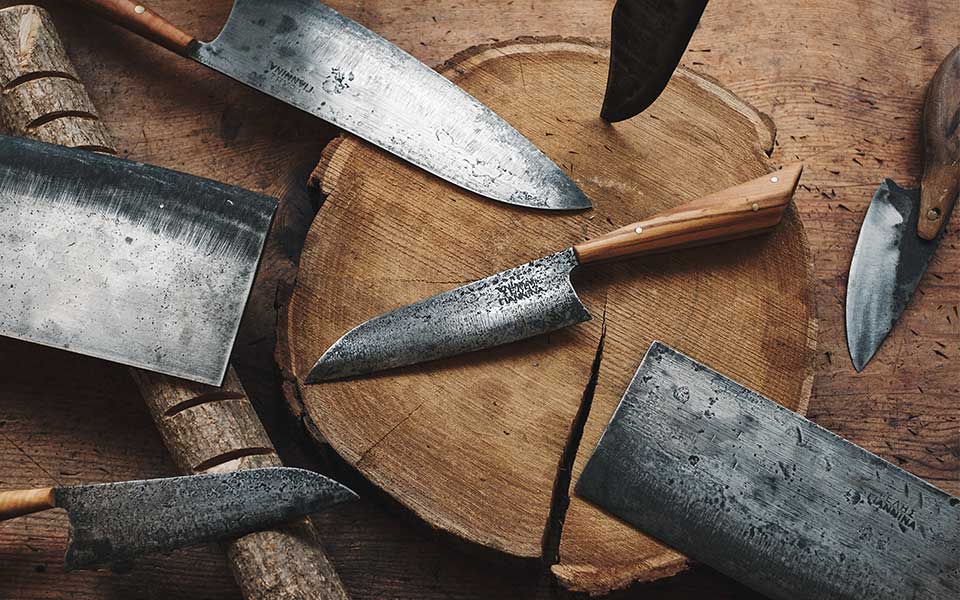
© Konstantinos Tsakalidis
Vangelis Gogos, knife maker
Vangelis Gogos and his wife Rania Piteni, the granddaughter of knife maker Aristotelis and the daughter of Adamantios, who taught his son-in-law the trade, now run “Telis’s” workshop. When the couple took over the business in 2016, they made the decision to adapt traditional knifemaking to modern needs. They worked together with regional industrial designers to add fresh designs to the collection. However, all items produced in the workshop are made entirely by hand.
We met at the small workshop on Zappa Street, in the center of Ioannina, across from the newly renovated and modernized “Telis’s”. “I do small jobs such as grinding, welding and repairs here. The main workshop is located outside the city,” he explains. Even though it’s Saturday night, he still has several hours of work ahead of him, which he says will continue the next day. “The metal I use is old steel that we found in the warehouse. It’s a difficult material that does not tolerate mistakes. If you don’t cut it straight from the start, it will bend once it is put on the grinder and all your previous work will be wasted. Many people try to fix or conceal it, but I throw it away because, in reality, it will never be perfect,” he says.
In addition to meat cleavers and machetes, cheese knives, and general-purpose knives, he also manufactures agricultural and livestock tools, such as shears, axes, etc.
Info
Telis
1 Zappa
Tel. (+30) 26510.291.66
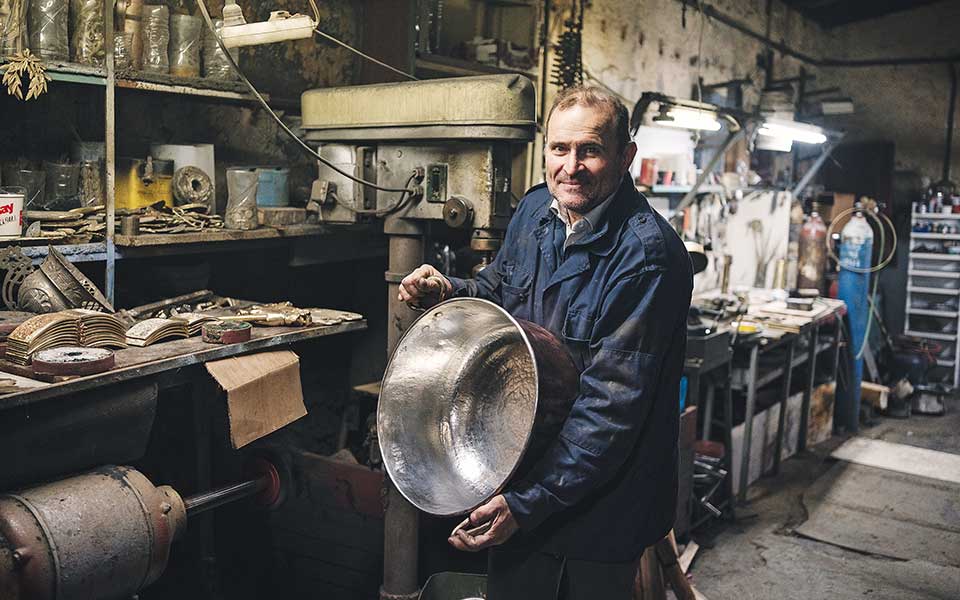
© Konstantinos Tsakalidis
Mihalis Papafotiou, bronze craftsman
Broutzos, the last remaining workshop producing bronze decorative and utilitarian items, is located at 116 Anexartisias Street, a prominent location in Ioannina’s old market. Mihalis Papafotiou and Anastasios-Dias Marinos took over the business from their fathers, who had been friends and partners for many years. From them they learned the “art of Hephaestus,” says Mr. Marinos, who still comes to the workshop every day even though he has retired. In the 1960s, their parents employed a dozen craftsmen to keep up with orders. Today, Mr. Papafotiou continues to create various church items, the most popular among the workshop’s output, as well as miniatures of ancient Greek statues, vases, and other decorative items, with the same passion and dedication. They also make bells, keys, and kitchen utensils such as pans, pots, mortars and pestles, etc.
Bells used to be one of the workshop’s staples, but not anymore. “A new workshop has opened in Paramythia, outside Ioannina, that does very good work. We still make some bells, mostly in small sizes,” says Mr. Papafotiou. Finally, they specialize in making replicas of weapons from various periods of Greek history, such as ancient spears, Byzantine swords, and Revolutionary War-era pistols.
Info
Broutzos
11 Anaxartisias
Tel. (+30) 26510.237.03

